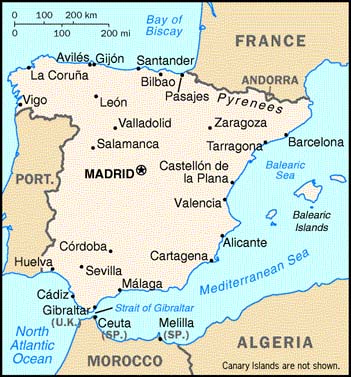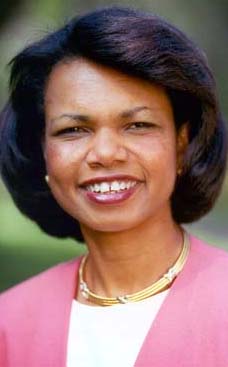2006.03.20: March 20, 2006: Headlines: Spain: International Programs: Orlando Sentinel: Spain is planning to launch an ambitious volunteer service in the region fashioned after former President John F. Kennedy's Peace Corps
Peace Corps Online:
Peace Corps News:
Peace Corps Library:
S - Other Topics:
2006.03.20: March 20, 2006: Headlines: Spain: International Programs: Orlando Sentinel: Spain is planning to launch an ambitious volunteer service in the region fashioned after former President John F. Kennedy's Peace Corps
Spain is planning to launch an ambitious volunteer service in the region fashioned after former President John F. Kennedy's Peace Corps

"At a time when Cuba is flooding Latin America with thousands of doctors and teachers, Venezuela seems to be writing checks to its neighbors around the clock and now even Spain is stepping up its aid to the region, the United States -- the world's biggest economy -- is not doing much to regain its 1960s image as a benevolent superpower. Judging from the foreign-aid figures, it looks like Washington hasn't even noticed what others are doing south of the border."
Spain is planning to launch an ambitious volunteer service in the region fashioned after former President John F. Kennedy's Peace Corps
While U.S. cuts aid, Spain plans volunteer corps
Andres Oppenheimer | Knight Ridder Newspapers
Posted March 20, 2006
While the Bush administration is cutting back foreign aid to Latin America, Spain -- the "other" economic superpower in the region -- is planning to launch an ambitious volunteer service in the region fashioned after former President John F. Kennedy's Peace Corps.
Spanish Foreign Minister Miguel Angel Moratinos wants to announce something that may be called the International Spanish Corps of Volunteers at the Ibero-American Summit scheduled for October in Montevideo, Uruguay, Spanish officials say.
"The plan would be open to include Latin American individuals and governments, with a special invitation to Brazil and Portugal," wrote columnist Miguel Angel Bastenier of Spain's daily El Pais. "It's goal is to be an across-the-board, joint and comprehensive effort to fight the big battle against underdevelopment."
Two senior Spanish foreign-affairs ministry officials told me that the plan is still in the drawing stages, and has not yet been sent to the government bureaucracy for closer review. But it would be in line with Prime Minister Jose Luis Rodriguez Zapatero's goal to substantially increase Spain's aid to Latin America, they say.
Since it took office two years ago, the left-of-center Rodriguez Zapatero government has increased foreign aid to Latin America from little more than $400 million in 2004 to more than $600 million in 2005. For this year, aid to the region is scheduled to surpass $700 million, Spanish Agency for International Cooperation director Aurora Diaz-Rato told me in a Wednesday phone interview.
The Spanish government has vowed to increase its worldwide foreign aid from 0.28 percent of the country's gross national product in 2004 to 0.5 percent in 2008.
According to the El Pais column, the volunteer corps plan would be coordinated with Enrique Iglesias, the former head of the Washington-based Inter-American Development Bank, who is now the head of the Madrid-based headquarters of the Ibero-American summits organization.
In a telephone interview from Brazil, where he was traveling Wednesday, Iglesias said the volunteer corps plan "is an interesting idea, which must be looked into, and which certainly is in line with the general goal of promoting a volunteer corps for young people" that his office is working on.
Iglesias said that, in coordination with the Ibero-American Youth Organization, his office is working on a massive program to send Spanish-speaking Latin Americans to spend their summer vacations learning Portuguese in Brazil, and Brazilian students to do the same in Spanish-speaking countries.
Likewise, the Ibero-American Summit office is planning a program to increase student exchanges across Latin America, Spain and Portugal, and eventually the United States, he said.
Spain's plans are in sharp contrast with the Bush administration's recent announcement that it plans to cut U.S. development funds to Latin America and the Caribbean by about 28 percent next year, and to reduce the overall U.S. economic and health-related assistance to the region by an estimated 7 percent.
What's more, the number of U.S. Peace Corps volunteers to the region has dwindled from nearly 4,000 in 1965 to 2,194 last year, even if it recovered from its all-time lows in the 1970s.
To be fair, U.S. aid to Latin America -- currently about $1.2 billion a year -- has been decreasing steadily for the past two decades, and is relatively unimportant compared with the $20 billion a year in U.S. investments in the region, the estimated $40 billion in family remittances sent by Latin American migrant workers, or the $276 billion worth of U.S. annual purchases from Latin America.
And it is also true that the Bush administration has launched a $5 billion Millenium Challenge Account for the world's poorest countries, which may include three or four Latin American nations, including Nicaragua and Honduras.
But the fact is that, at a time when Cuba is flooding Latin America with thousands of doctors and teachers, Venezuela seems to be writing checks to its neighbors around the clock and now even Spain is stepping up its aid to the region, the United States -- the world's biggest economy -- is not doing much to regain its 1960s image as a benevolent superpower. Judging from the foreign-aid figures, it looks like Washington hasn't even noticed what others are doing south of the border.
Andres Oppenheimer can be reached at aoppenheimer@miamiherald.com.
When this story was posted in March 2006, this was on the front page of PCOL:





Peace Corps Online The Independent News Forum serving Returned Peace Corps Volunteers
 | History of the Peace Corps
PCOL is proud to announce that Phase One of the "History of the Peace Corps" is now available online. This installment includes over 5,000 pages of primary source documents from the archives of the Peace Corps including every issue of "Peace Corps News," "Peace Corps Times," "Peace Corps Volunteer," "Action Update," and every annual report of the Peace Corps to Congress since 1961. "Ask Not" is an ongoing project. Read how you can help. |
 | The Peace Corps Library
The Peace Corps Library is now available online with over 40,000 index entries in 500 categories. Looking for a Returned Volunteer? Check our RPCV Directory. New: Sign up to receive PCOL Magazine, our free Monthly Magazine by email. Like to keep up with Peace Corps news as it happens? Sign up to recieve a daily summary of Peace Corps stories from around the world. |
 | Peace Corps suspends program in Bangladesh
Peace Corps Director Gaddi H. Vasquez announced the suspension of the Peace Corps program in Bangladesh on March 15. The safety and security of volunteers is the number one priority of the Peace Corps. Therefore, all Peace Corps volunteers serving in Bangladesh have safely left the country. More than 280 Peace Corps volunteers have served in Bangladesh since the program opened in November 1998. Latest: What other newspapers say. |
 | Invitee re-assigned after inflammatory remarks
The Peace Corps has pulled the invitation to Derek Volkart to join the Morocco Training Program and offered him a position in the Pacific instead after officials read an article in which he stated that his decision to join the Peace Corps was in "response to our current fascist government." RPCV Lew Nash says that "If Derek Volkart spoke his mind as freely in Morocco about the Moroccan monarchy it could cause major problems for himself and other Peace Corps volunteers." Latest: The Ashland Daily Tidings has issued a request for all Peace Corps communications on the case. |
 | Re-envision Peace Corps
Nicholas J. Slabbert says in his article in the Harvard International Review that an imaginatively reinvented Peace Corps could powerfully promote US interests in a period when perceptions of American motives are increasingly relevant to global realignment. His study envisions a new role for the Peace Corps in five linked areas: (1) reinventing America's international profile via a new use of soft power; (2) moving from a war-defined, non-technological, reactive theory of peace to a theory of peace as a normal, proactive component of technologically advanced democracy; (3) reappraising Peace Corps as a national strategic asset whose value remains largely untapped; (4) Peace Corps as a model for the technological reinvention of government agencies for the 21st century; (5) redefining civil society as information technology society. Read the article and leave your comments. |
 | March 1, 1961: Keeping Kennedy's Promise
On March 1, 1961, President John F. Kennedy issues Executive Order #10924, establishing the Peace Corps as a new agency: "Life in the Peace Corps will not be easy. There will be no salary and allowances will be at a level sufficient only to maintain health and meet basic needs. Men and women will be expected to work and live alongside the nationals of the country in which they are stationed--doing the same work, eating the same food, talking the same language. But if the life will not be easy, it will be rich and satisfying. For every young American who participates in the Peace Corps--who works in a foreign land--will know that he or she is sharing in the great common task of bringing to man that decent way of life which is the foundation of freedom and a condition of peace. " |
 | Paid Vacations in the Third World?
Retired diplomat Peter Rice has written a letter to the Wall Street Journal stating that Peace Corps "is really just a U.S. government program for paid vacations in the Third World." Director Vasquez has responded that "the small stipend volunteers receive during their two years of service is more than returned in the understanding fostered in communities throughout the world and here at home." What do RPCVs think? |
 | RPCV admits to abuse while in Peace Corps
Timothy Ronald Obert has pleaded guilty to sexually abusing a minor in Costa Rica while serving there as a Peace Corps volunteer. "The Peace Corps has a zero tolerance policy for misconduct that violates the law or standards of conduct established by the Peace Corps," said Peace Corps Director Gaddi H. Vasquez. Could inadequate screening have been partly to blame? Mr. Obert's resume, which he had submitted to the Peace Corps in support of his application to become a Peace Corps Volunteer, showed that he had repeatedly sought and obtained positions working with underprivileged children. Read what RPCVs have to say about this case. |
 | Why blurring the lines puts PCVs in danger
When the National Call to Service legislation was amended to include Peace Corps in December of 2002, this country had not yet invaded Iraq and was not in prolonged military engagement in the Middle East, as it is now. Read the story of how one volunteer spent three years in captivity from 1976 to 1980 as the hostage of a insurrection group in Colombia in Joanne Marie Roll's op-ed on why this legislation may put soldier/PCVs in the same kind of danger. Latest: Read the ongoing dialog on the subject. |
 | Friends of the Peace Corps 170,000 strong
170,000 is a very special number for the RPCV community - it's the number of Volunteers who have served in the Peace Corps since 1961. It's also a number that is very special to us because March is the first month since our founding in January, 2001 that our readership has exceeded 170,000. And while we know that not everyone who comes to this site is an RPCV, they are all "Friends of the Peace Corps." Thanks everybody for making PCOL your source of news for the Returned Volunteer community. |
Read the stories and leave your comments.

Some postings on Peace Corps Online are provided to the individual members of this group without permission of the copyright owner for the non-profit purposes of criticism, comment, education, scholarship, and research under the "Fair Use" provisions of U.S. Government copyright laws and they may not be distributed further without permission of the copyright owner. Peace Corps Online does not vouch for the accuracy of the content of the postings, which is the sole responsibility of the copyright holder.
Story Source: Orlando Sentinel
This story has been posted in the following forums: : Headlines; Spain; International Programs
PCOL32209
80


















